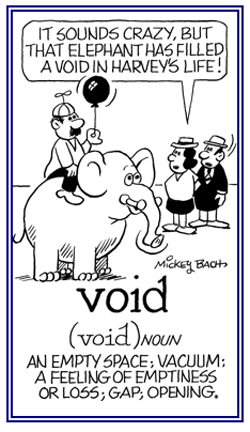void
(Latin: unoccupied, vacant; related to vacuus, "empty")
void (adjective) (not comparable)
1. A reference to an empty area or space: By midnight, the street will be void of people and traffic.
2. Pertaining to a state of nonexistence: Ted thought the novel he was reading was void of interest; so, he planned to take it back to the library tomorrow.
2. Pertaining to a state of nonexistence: Ted thought the novel he was reading was void of interest; so, he planned to take it back to the library tomorrow.
1. A large empty space: As a result of the severe drought, or extreme lack of rain, the lake became void of water.
2. An emptiness caused by the loss of something or someone: After his dog died, Matt had a void in his life.

© ALL rights are reserved.
Go to this Word A Day Revisited Index
2. An emptiness caused by the loss of something or someone: After his dog died, Matt had a void in his life.

Go to this Word A Day Revisited Index
so you can see more of Mickey Bach's cartoons.
void (verb), voids; voided; voiding
1. To clear a room, a house, or a place of occupants or to empty or to clear a place, receptacle, etc. of something: The overloaded gas tank of the car at the filling station was voiding when the customer tried to add too much gas.
2. Making or declaring something as invalid or that it is no longer in effect: The guarantee of the vacuum cleaner stated that any unauthorized repairs would void the warranty.
3. To take away a legal force of or to render something ineffective and to declare it as invalid: The trial about Bill's speeding was voided by the judge because it was only a mile over the limit in that section,
2. Making or declaring something as invalid or that it is no longer in effect: The guarantee of the vacuum cleaner stated that any unauthorized repairs would void the warranty.
3. To take away a legal force of or to render something ineffective and to declare it as invalid: The trial about Bill's speeding was voided by the judge because it was only a mile over the limit in that section,
The U.S. Embassy issued a new passport and voided the old one for Andrew.
A contract can be valid, but it may be legally voided at the option of anyone who is involved.
The quality of something which can be rescinded or declared legally unbinding: The violability of the reservation was possible, so James retracted the booking within the time limit allowed.
voidable (adjective), more voidable, most voidable
1. Able to be annulled or invalidated: James was surprised that the contracts were voidable and could be revoked.
2. In law, capable of being made or adjudged to be no longer legally binding: A marriage can be voidable when two people have never lived together and have not had any relationship with other.
2. In law, capable of being made or adjudged to be no longer legally binding: A marriage can be voidable when two people have never lived together and have not had any relationship with other.
A situation in which something is not legal or not legally enforceable.
The relative amount of space that is left between objects which are packed together; a gap.
1. The act of depriving a contract of legal force.
2. The process of making something empty.
3. A situation of having no incumbent or occupant; such as, when there is no bishop in a diocese.
4. Evasion; subterfuge.
2. The process of making something empty.
3. A situation of having no incumbent or occupant; such as, when there is no bishop in a diocese.
4. Evasion; subterfuge.
voided (adjective), more voided, most voided
1. A reference to not being legally binding nor valid: "Mark ended up with a voided contract."
2. Having a section or area that has been cut out or omitted; such as, a voided christian cross.
3. In heraldry: depicted as if the center had been removed so as to leave only an outline; having the center and a narrow surrounding area removed or left empty.
2. Having a section or area that has been cut out or omitted; such as, a voided christian cross.
3. In heraldry: depicted as if the center had been removed so as to leave only an outline; having the center and a narrow surrounding area removed or left empty.
1. An official who can invalidate or nullify: "Mary's bank check was voided and she wanted to know who the voider was".
2. A piece of chain mail covering a place unprotected by armor plate.
2. A piece of chain mail covering a place unprotected by armor plate.
1. Emptiness; vacuity; destitution.
2. Nullification; inefficacy; lacking binding force.
3. Without or having no substantiality.
2. Nullification; inefficacy; lacking binding force.
3. Without or having no substantiality.
Showing page 2 out of 2 pages of 26 main-word entries or main-word-entry groups.

